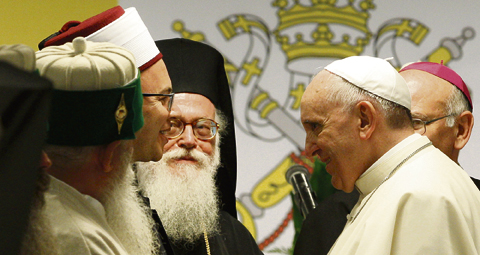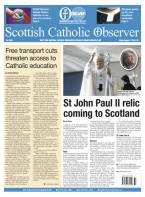April 17 | ![]() 0 COMMENTS
0 COMMENTS ![]() print
print

Celebrating the best of faith traditions
Fr Ronald Rolheiser
We live inside a world and inside religions that are too given to disrespect and violence. Virtually every news bulletin today documents the prevalence of disrespect and violence done in the name of religion, disrespect done for the sake of God—strange as that expression may seem. Invariably those acting in this way see their actions as sacral, justified by sacred cause.
And, if history is to be believed, it has always been so. No religion— Christianity no less than any other—has been innocent. Every one of the great religions of the world has been, at various times, both persecuted and persecutor. So this begs the question: What are some fundamental principles we are asked to live out apposite our relationship to other faiths, irrespective our particular faith?
What’s best in each of our traditions would suggest these ten principles:
— All that is good, true, and beautiful comes from one and the same author, God. Nothing that is true, irrespective of its particular religious or secular cloak, may be seen as opposed to true faith and religion.
— God wills the salvation of all people, equally, without discrimination. God has no favourites. All people have access to God and to God’s Spirit, and the whole of humankind has never lacked for divine providence. Moreover each religion is to reject nothing that is true and holy in other religions.
— No one religion or denomination has the full and whole truth. God is both infinite and ineffable. For this reason, by definition, God cannot be captured adequately in human concepts and
language. Thus, while our knowledge of God may be true, it is always only partial. God can be truly known, but God cannot be adequately thought.
— All faiths and religions are journeying towards the fullness of truth. No one religion or denomination may consider its truth complete, something to permanently rest within; rather it must see it as a starting point from which to journey. Moreover, as various religions —and denominations and sectarian groups within those religions—we need to feel secure enough within our own ‘home’ so as to acknowledge the truth and beauty that is expressed in other ‘homes.’ We need to accept—and, I suggest, be pleased—that there are other lives within which the faith is written in a different language.
— Diversity within religions is a richness, willed by God. God does not just wish our unity; God also blesses our diversity that helps reveal the stunning over-abundance within God. Religious diversity is the cause of much tension, but that diversity and the struggle to overcome it will contribute strongly to the richness of our eventual unity.
—God is ‘scattered’ in world religions. Anything that is positive within a religion expresses something of God and contributes to divine revelation. Hence, seen from this aspect, the various religions of the world all help to make God known.
— Each person must account for his or her faith on the basis of his or her own conscience. Each of us must take responsibility for our own faith and salvation.
— Intentionally, all the great world religions interpenetrate each other—and, for a Christian, that means that they interpenetrate the mystery of Christ. A genuine faith knows that God is solicitous for everyone and that God’s spirit blows freely and therefore it strives to relate itself to the intentionality of other religions and to other denominations and sectarian groups within its own religion.
— A simple external, historical link to any religion is less important than achieving a personal relationship, ideally of intimacy, with God. What God wants most deeply from us, irrespective of our religion, is not a religious practice but a personal relationship that transforms our lives so as to radiate God’s goodness, truth, and beauty more clearly.
— Within our lives and within our relationship to other religions, respect, graciousness, and charity must trump all other considerations. This does not mean that all religions are equal and that faith can be reduced to its lowest common denominator, but it does mean that what lies deepest inside of every sincere faith are these fundamentals: respect, graciousness, and charity.
Throughout history, great thinkers have grappled with the problem of the one and the many. And, consciously or unconsciously, all of us also struggle with that tension between the one and the many, the relationship between unity and diversity; but perhaps this is not so much a problem as it is a richness that reflects the over-abundance of God and our human struggle to grasp that over-abundance. Perhaps the issue of religious diversity might be described in this way:
— Different peoples, one earth
— Different beliefs, one God
— Different languages, one heart
— Different failings, one law of gravity
— Different energies, one Spirit
— Different scriptures, one Word
— Different forms of worship, one desire
— Different histories, one destiny
— Different disciplines, one aim
— l Different approaches, one road
— Different faiths—one Mother, one Father, one earth, one sky, one
beginning, one end.
— Fr Ronald Rolheiser is a priest and member of the Missionary Oblates of Mary Immaculate. He is president of the Oblate School of Theology in San Antonio, Texas. Visit his website at http://ronrolheiser.com











